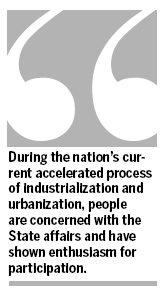Op-Ed Contributors
Seek truths from numbers
By Wang Shaojie (China Daily)
Updated: 2010-04-01 07:48
 |
Large Medium Small |
Nation should improve compiling of statistics in fast-changing world and begin including a full range of individuals
National statistics have a crucial bearing on the government's decision-making if policies are implemented efficiently. They also greatly inform about people's daily lives. Recently, China's statistical work has taken a hit for its capacity, quality and credibility in detailing the economic globalization and how the nation's information technology is advancing.
Though the National People's Congress (NPC) Standing Committee passed the revised "Statistics Law of the People's Republic of China" in June 2009, raising the hopes of many at the time, the reality is that China's statistical work is far from satisfactory.
| ||||
Second, the statistical range is too narrow when surveying the average salary of urban workers. According to NBS data in July 2009, the year-on-year growth rates of both the average wage of on-duty staff and workers and per capita disposable income of urban residents exceeded 10 percent. Netizens quickly swarmed on what they believed was skewed data, mocking how "income has now increased".
The huge gap between the data and what residents think the data really should be reflects the fault in the delimitation of statistical range. According to the existing statistical system, the average wage of on-duty staff and workers in urban units only covers State-owned units, urban collective units, as well as joint-stock and foreign-funded units while excluding private enterprises, self-employed individuals and migrant workers, which account for 70 percent of the nation's total workers. So the current statistical methods do not reflect the actual income of urban residents.
Third, the registered urban unemployment rate does not reflect the actual employment landscape. Employment is the priority on the Party agenda and the government in improving people's livelihood. Though subjected to the international financial crisis, the nation's registered urban unemployment rate in 2009 was at 4.3 percent. In fact, since 2003 the rate has been ranging between 4.0 and 4.3 percent. The official figure of the registered urban unemployment was 4.2 percent in 2008. However, statistics by the Chinese Academy of Social Sciences said it was 9 percent, far exceeding the international warning line of 7 percent. Due to a large number of unregistered, unemployed people and the exclusion of farmers, the officially released registered unemployment rate is remarkably lower than the surveyed unemployment rate.
During the nation's current accelerated process of industrialization and urbanization, people are concerned with the State affairs and have shown enthusiasm for participation. It is imperative for the authorities to further improve the credibility of statistics to meet the needs of economic and social development. To do this, there are four things the government could accomplish. 
First, the government should strengthen law enforcement and supervision. Those who violate the rules and fabricate data for the purpose of winning a promotion should be penalized according to the law.
Second, we should actively attempt to reform the nation's statistical system and methods, and adopt the internationally accepted accounting methods to compile GDP statistics. Double counting of data should be avoided to ensure the authenticity of the statistics. Statisticians should be given enough time to do their duties to obtain true numbers.
Third, adhere to the principles of "put people first" and "seek the truth with facts", and adjust the survey range and subjects as soon as possible. We should immediately calculate the real unemployment rate in cities, which should include migrant workers. The number of rural people who do not have a job must also be counted and made public.
Fourth, increase public participation in statistical work and timely inform the public about the survey range, indicators, calculation methods and sample selection. The NBS should enhance coordination and labor division with different sectors and local authorities. And more special poll organizations are welcomed. The authority could encourage nongovernmental organizations and third-party institutions (including academic institutions) to engage in statistical work to strengthen supervision and form a statistical work system.
The author is a standing member of the National Committee of the Chinese People's Political Consultative Conference and a professor at Wuhan University.
(China Daily 04/01/2010 page8)











